Previously on Drokk!: Things aren’t looking good in Mega-City One; the Justice Department is starting to think that Dredd might be getting too old for the job, and that his clone, Kraken — who is probably getting over that brainwashing about killing everyone in MC1 by now, maybe — could possibly be the ideal replacement. Meanwhile, another 2000 AD strip, The Dead Man, has shown a future Dredd having taken the Long Walk, convinced that something very bad has happened to the city in his absence. Could these things be connected…? (Spoiler: Yes.)
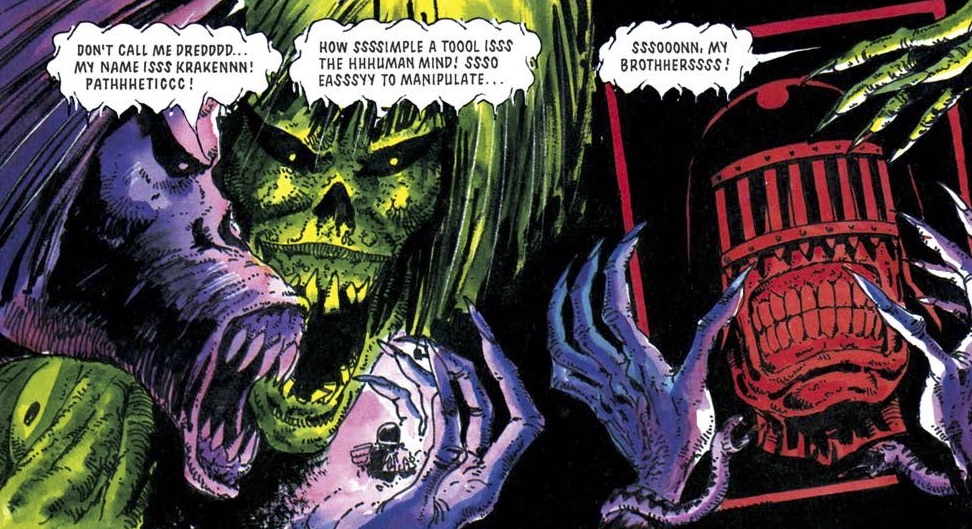
0:00:00-0:02:18: With great speed, we introduce ourselves and also what we’re talking about this time around: Judge Dredd: The Complete Case Files Vol. 14, which is pretty much all one story for once, with that story being “Necropolis,” AKA my favorite of all the “mega-epic” storylines. Also unusual: the entire case files this time is the work of John Wagner, in terms of writing, with Carlos Ezquerra handling by far the majority of the artwork.
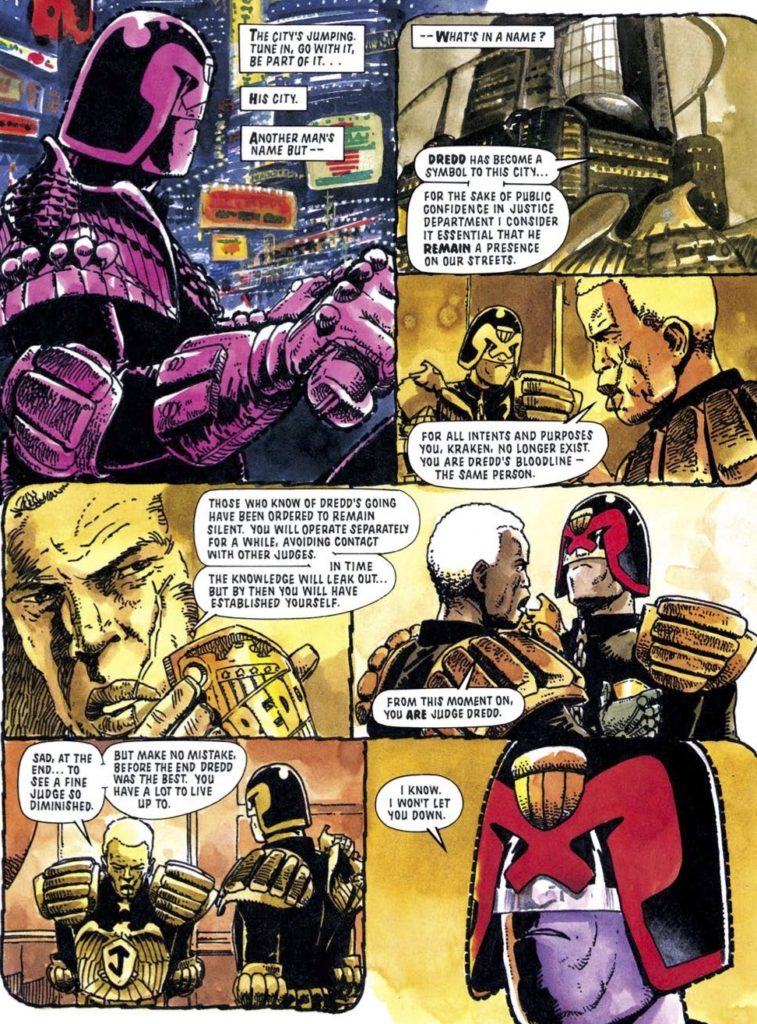
0:02:19-0:16:57: Jeff isn’t as completely onboard with the book as I am, and we start to dig into why, especially because there’s so much that he does like. Is David Foster Wallace to blame? (The first of many literary references this episode.) We also talk about the ways in which this storyline is so unlike Dredd in its focus on continuity, and the way that might have influenced Jeff’s feelings towards it, and compliment the art of Carlos Ezquerra, and not for the last time this episode.
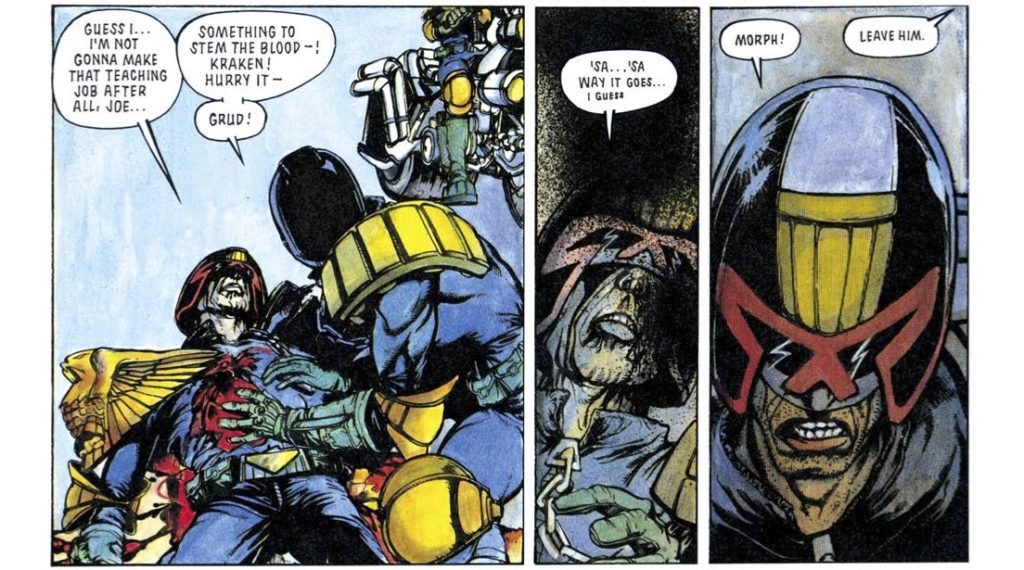
0:16:58-0:32:42: I ask whether or not Dredd’s personal evolution is a little sudden to be believable, given how quickly it seems to have occurred, leading to a discussion about Dredd’s personal assumption of guilt versus Kraken’s, and whether or not the story is also about the repeated failures of the Judges — and MC1 in general — as an institution, and the importance of looking outside of the system for solutions. (Which, in itself, is a pretty big change for Dredd as a person and Judge Dredd as a series.)
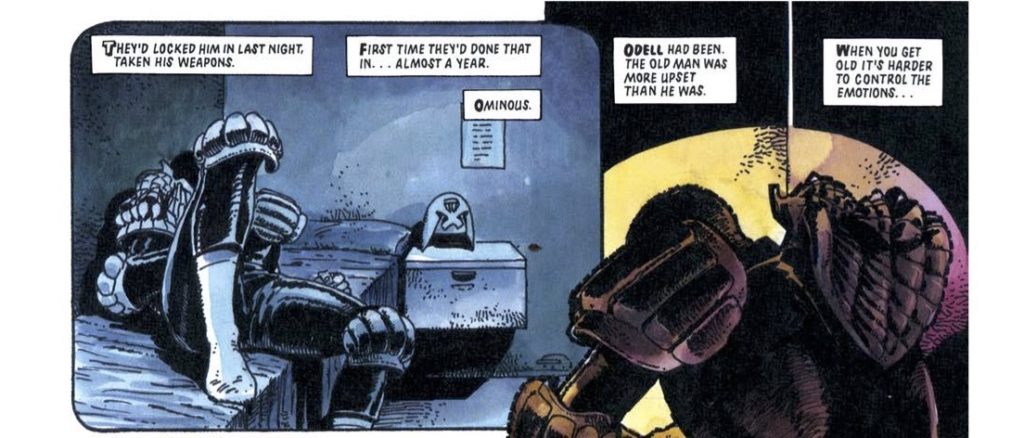
0:32:43-0:52:16: If “Necropolis” is an allegory — and, really, any argument that it isn’t feels doomed to failure, considering — then is that the reason Jeff finds the ending so overwhelming? Is there even an ending that Jeff would fully appreciate? It’s unclear, and he’s very concerned about being the Russian judge (in a sporting contest, not the Dredd sense) in seeming to score the effort too harshly, so we may never know. Meanwhile, I wonder about the epilogue stories to be found in Vol. 15, and whether those are the conclusion we miss in this book, and also complain about the time jump midway through this story. I also, as is my wont, suggest that the lack of closure on the idea of Kraken being Dredd’s shadow self isn’t as disappointing as it first appears, because Wagner will return to the idea many, many years later. Ain’t I a stinker?
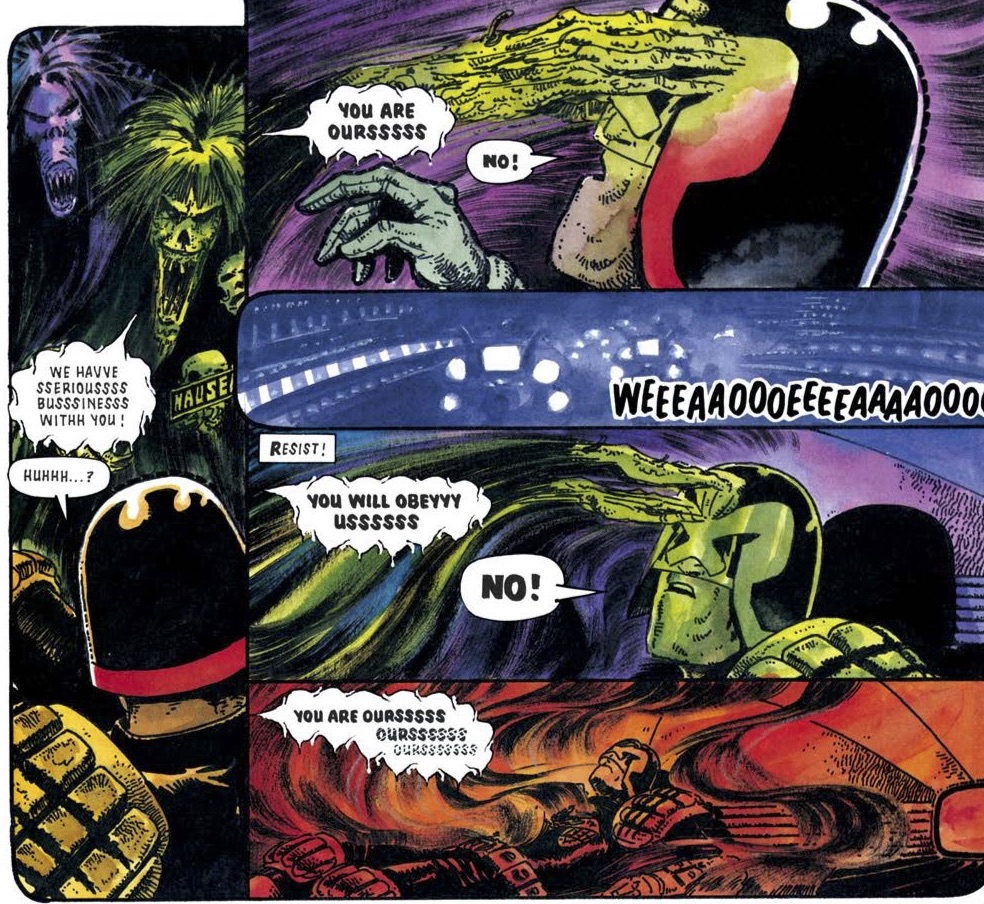
0:52:17-0:55:02: While “Necropolis” isn’t a story about a virus outbreak — a surprisingly common theme in Dredd, as it turns out, if you think about “The Cursed Earth,” “Block Mania,” “Sin City,” and “Day of Chaos” to name but four examples — that doesn’t mean it’s not a story that’s occasionally uncomfortable to read in our current pandemic reality. We unpack that (very) briefly.
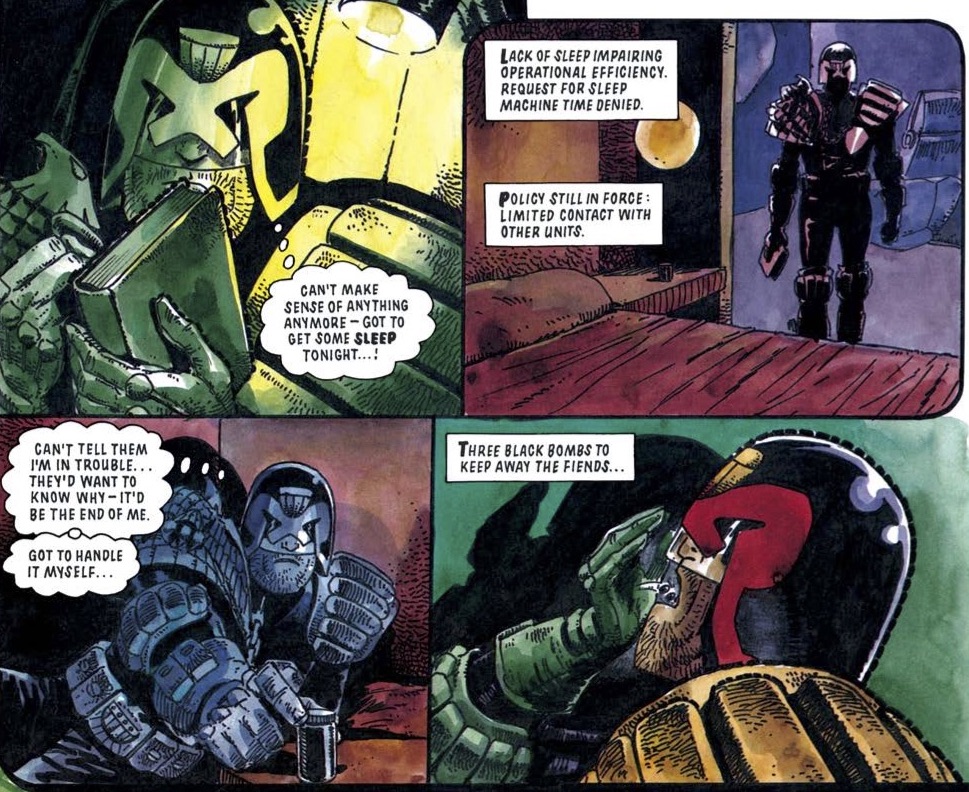
0:55:03-1:47:16: Having made it almost an hour without actually telling everyone what “Necropolis” is about, Jeff and I try to run through a plot synopsis of the storyline, something I foolishly think will be easy… only to continually distract ourselves with all kinds of other matters. Is there a James Ellroy reference to be found in Kraken’s plight? What is the connection between Kraken and Charlie Brown? How great is the return of Chief Judge McGruder, and what does she bring to this storyline and the strip as a whole? Just how important is empathy to this storyline and what and who Judge Dredd will become? How touched were we both about the fact that Dredd can finally forgive Kraken, after everything, and also put himself in Kraken’s oversized boots? And, perhaps most importantly of all, how does that whole “lawgivers will explode if someone else tries to fire them” thing work, anyway, given how this story plays out? Here’s the thing: We don’t really get to the end of the synopsis, entirely, but you can work it out if you’re paying attention. (Look, I said we got distracted.)
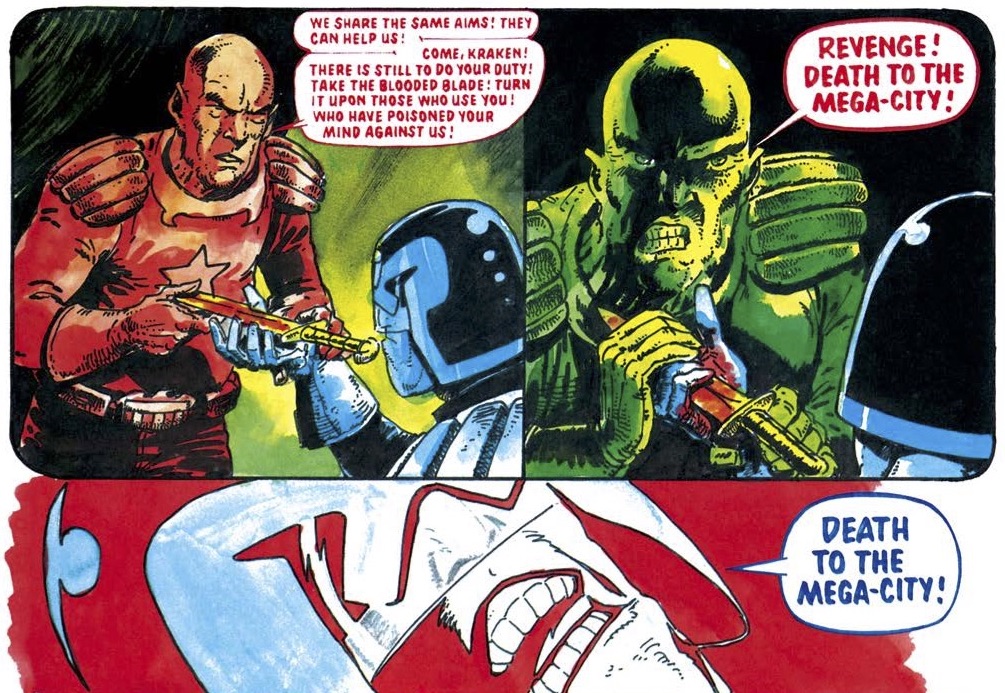
1:47:17-2:07:16: You can tell how well we work, given that I try and start us talking about things about the story that we like, and Jeff immediately brings up the suggested racism in the story. Perhaps that’s because it’s hard to pick specific favorite moments out of this extended narrative, though both of us try: Jeff goes for Kraken’s corruption dream and how headfucky things get for him in regards to Kraken’s deprogramming and reprogramming, while I get very excited about the slow oncoming dread of the first eleven chapters of “Necropolis” proper. Also! Are you surprised just how dark a story about a city overcome with dark forces actually gets? I was! And Jeff prefers “The Apocalypse War” to “Necropolis,” but everyone’s allowed to be wrong sometimes.

2:07:17-2:13:53: I’m in two minds about where to go next, so I literally ask Jeff — which leads to the decision that we’re covering Judge Dredd: The Restricted Files Vol. 2 next month — and then we start talking about the short term future of Dredd the strip as the Case Files move into the 1990s. I’m not excited, but Jeff remains optimistic that the Garth Ennis stories are better than everyone says they are.
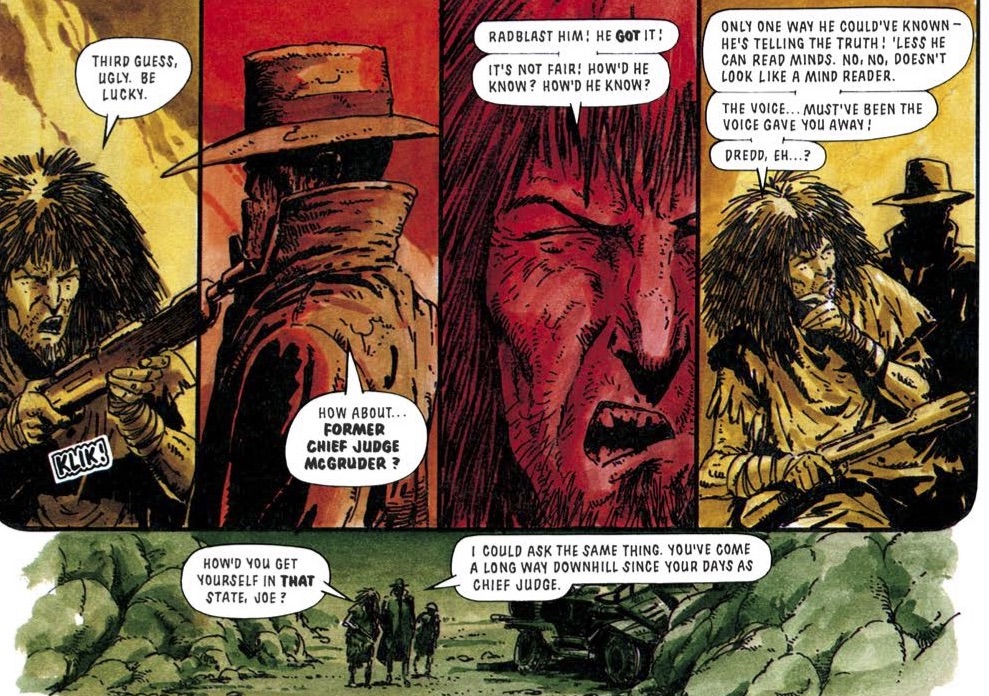
2:13:54-end: Eventually, we wrap things up by telling you about the Tumblr, really-not-as-dead-as-it-seems Instagram, Twitter and Patreon accounts and wishing you all good health and smart choices in these trying times. As always, thank you for listening and reading along. Next month: We return to the Wagner/Grant era for stories from specials and annuals! So that’ll be a little bit brighter and less pessimistic, I hope.
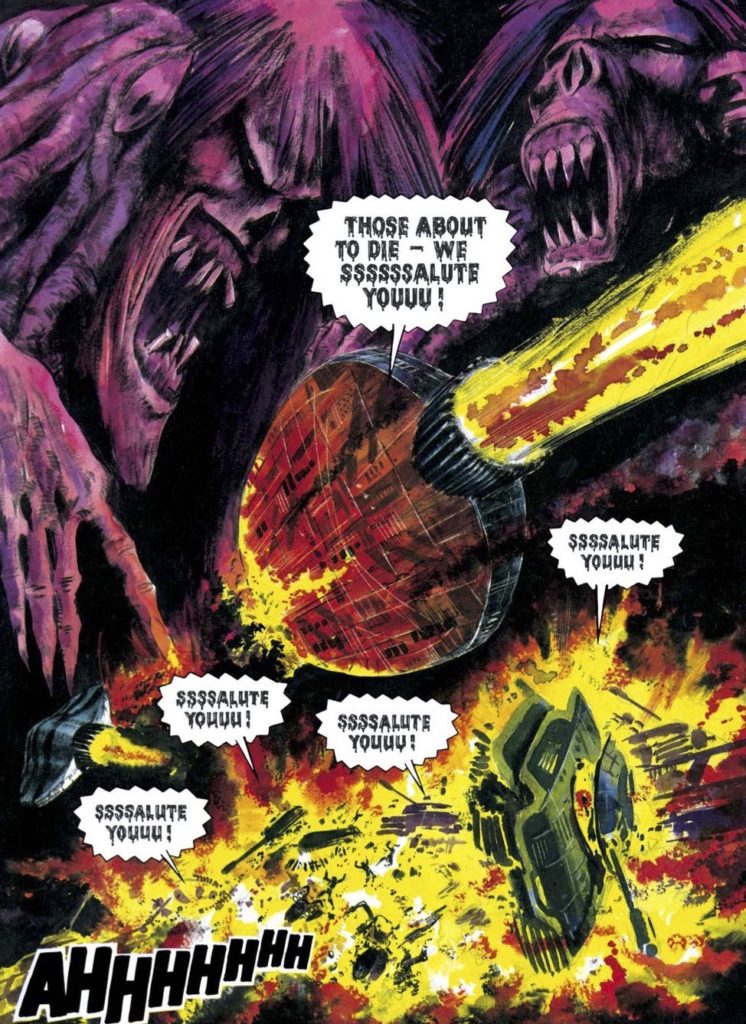


One thing I thought of when reading this collection was how Necropolis would be handled by modern superhero comics. There’d be the main title, then spin-off miniseries for Anderson, the cadets, and probably someone else (Kraken?) as well. Considering how “easy” it would have been for them to do other series in 2000ad as well as Dredd that were set during Necropolis it’s interesting that they didn’t bother. (And maybe they even made sure that other Dredd-verse series weren’t running at the same time as Anderson and Chopper both had series that finished shortly before Necropolis.)
Anyway, I wanted more stories with the cadets and I don’t think it happens. (Sort of related, but I think it’s interesting that currently 2000ad is doing occasional “Regened” issues that are supposed to be “all-ages” and are presumably trying to tap into the lucrative kids/YA graphic novel market, when they used to be aimed at that audience.)
In regards to how judges view the law I was reading the first Judge Anderson collection and a section where she’ s in a “reindoctrination class” had this line: “It is your prime duty to uphold the law. Whether it is right or wrong, good or bad, is not your concern!”
As for the art, one thing that stood out for me in this volume was when Ezquerra chose not to use colour in one panel of Judge Mortis. I found it helped make that character seem particularly unearthly. I kind of hate the computer colouring on later Ezquerra comics, especially compared to what’s in this volume.
Also, my “no-prize” for why the gun works for Dredd is that McGruder is able to reprogram it using special chief judge vocal commands. (The guns are voice activated and the story later indicates McGruder’s voice print is on file and they use voice matching technology, so it sort of makes sense… The Judge Dredd wiki says “However, recognising that [Lawgiver’s self destructing] may interfere with a Judge performing their duties in the field, the Justice Department does maintain instructions on how to bypass the security feature. This information is only accessible by Senior Judges and above, and was demonstrated by Judge Dredd when one of his partners was killed during an investigation.” though doesn’t provide a citation.)
Scattered thoughts:-
– I’m sort of with Jeff Lester that The Apocalypse War is my sentimental favorite among Judge Dredd stories — but Necropolis is, I think, objectively the better and more morally serious of the two. Which is part of why I personally have that little bit more affection for TAW, because it’s a little more “my” Dredd, with the energy that comes with being throwaway and ephemeral and having no hope of ever being respected, while Necropolis is Wagner’s supreme statement in this era in which his creation was being recognized as one of the great creations of modern British popular culture. But it’s not that I don’t love Necropolis, because I do – I have really vivid memories of assembling all of my 2000 AD’s when it was done and rereading the whole thing from start to finish. It’s pretty much the end of my Dredd, really – I kept reading for a while, into the Garth Ennis era, but it’s the last Judge Dredd story that I truly, unequivocally loved as a regular 2000 AD reader.
– One thing that niggled me a bit at the time was that the story assumed that the Dark Judges felt that Dredd was somehow special. I had liked the line in Judge Death Lives! – “Anderssson – and another judge” – that from Death’s perspective, Dredd was nobody important. It’s similar to my affection for those moments at which other judges don’t know that Dredd is the main character in the story.
But, reading it now, I’m inclined to think that’s the point: this is Wagner wrestling with the fact that his creation has become iconic, immortal, and irreplaceable – that there will always be a Judge Dredd, whether or not he’s writing it. That this story about Dredd being too important in the public eye to be allowed to end, and the powers that be kludging in a substitute ersatz Dredd with disastrous results happened so close in time to the expansion of Judge Dredd-branded content with the Megazine and Wagner himself moving away from Dredd — I don’t think that’s entirely an accident, nor is it an accident that he writes a story that, as our hosts explored, should be the end of Judge Dredd, and isn’t. I’ve never felt so inclined to agree with Pat Mills that John Wagner’s Joe Dredd is John Wagner than when reading this story again last week.
-One amusing historical coincidence. Obviously this story brings McGruder back, and she is more explicitly a Thatcher expy than before. Unlike The Apocalypse War, though, which is eerie in its juxtaposition with the Falklands War, here Wagner didn’t get the timing right. This all ended about a month before Thatcher fell from power. Wagner was losing it – the old John Wagner would have had the next Chief Judge be from Acc-Div.
– Our hosts said some great and entirely accurate things about just how amazing Carlos Ezquerra is here. (One other thing: some fabulous choices of when to do panels in one colour only.) There are some terrifying images here of the mind-controlled judges on patrol. I mean, Mega-City One was already a police state – that’s the point. How do you depict it as *more* of a terrifying police state? Carlos Ezquerra knows.
– Has there ever been a story in which an agony aunt was actually created by Justice Department as a way to gather useful and incriminating information?
Apparently, I was a bit hasty in bringing up when I stopped regularly reading 2000ad and therefore Dredd. I read up to somewhere when the Sisters started to seduce Kraken. I didn’t stop then because I wasn’t enjoying the story, but because I went to live on Saltspring Island for 6 months, So, among other things, it was good to get a little context for the unusual state of McGruder when I picked it up again.
I wasn’t surprised that Dredd changed his mind quickly, when he did. It’s literally in his skill set to make swift decisions. Possibly one of the reasons the Long Walk was instituted. Has there been a story of disaffected judges rebelling before such traditions were created?
Anyway, I didn’t miss not having Dredd as Hamlet. I would have liked it if they’d played a longer game and won me over to Kraken’s side more. Allowed him a solid, significant victory, to have saved the city, let him address some inner demons, before falling to the external ones. At leas,t I think I would have liked that more, but clearly Wagner is writing a great comic here, so maybe not.
I can see what Jeff means about the forgiveness of the shadowself, but it says something about how good this comic is, that for me Kraken shifts back and forth from that to being a dispatched scapegoat.
I’ll enthusiastically agree with all the praise for Ezquerra in this episode. A minor addition, was I liked seeing someone as skilled and confident as Ezquerra make the Dark Judges his own.
One thing I have been wondering is where does America fit in with the case files? Will you read that one like you read The Dead Man with this one?